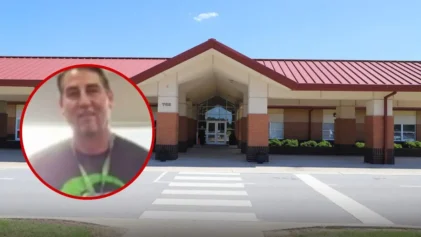Aidan Ellison, a 19-year-old Black teen in Oregon, allegedly was shot and killed during a confrontation over loud music that was similar to a 2012 deadly shooting in Florida.
Robert Paul Keegan, 47, was arrested and charged with second-degree murder, first-degree manslaughter, reckless endangering and unlawful carrying of a firearm in connection with the Nov. 23 incident. He remained jailed with no bond Monday.
The shooting unfolded in the early morning of Nov. 23 in the parking lot of the Stratford Inn motel in Ashland, Oregon. Both men were staying at the motel but didn’t know each other.
Keegan, a Talent, Oregon man, pulled a gun from his coat as the two were arguing about Ellison playing loud music in the parking lot of the motel after 4 a.m. and shot the teen once in the chest, according to the Ashland Police Department.
Ellison died at the scene. Keegan was taken into police custody.

“Aidan’s murder isn’t a Black problem, but a community problem,” said leaders of activist group Southern Oregon Black Leaders, Activists, and Community Coalition. “Ashland, and all of Southern Oregon has a problem with racism, and the only way to address this problem is to demand stronger policies that protect Black lives and more severe consequences for anti-Black racism.”
A GoFundMe set up in Ellison’s name had raised more than $17,000 by Monday. His murder comes exactly eight years after Jordan Davis, a 17-year-old Black teenager, was shot in the parking lot of a Jacksonville, Florida gas station in 2012. The two shootings share parallels. Davis was killed by Michael Dunn, a 45-year-old white man, after an argument over loud “thug music.” Dunn began shooting at a vehicle Davis was in with three of his friends because the teens didn’t turn their music down. Dunn claimed he was threatened and someone pointed a shotgun at him. But police found no firearms in the teens’ SUV.
Dunn was ultimately convicted of first-degree murder in Davis’ killing and sentenced to life in prison without parole.
Davis’ mother, Lucy McBath, was elected to the U.S. House of Representatives for Georgia’s 6th Congressional District in 2018. McBath, a Democrat, was reelected earlier this month in the once solidly Republican district.
When reached for comment, one of Ellison’s family members declined Monday, citing the wishes of his closest relatives.
Precious Edmonds, a spokesperson for SOBLACC told The Oregonian that loud music wasn’t actually what triggered Ellison’s slaying.
“The incident where Aidan was shot after an argument listening to his music was really about him not submitting to that man’s perceived authority,” Edmonds said.
SOBLACC is organizing a Dec. 7 vigil in Ellison’s honor. The group issued a Nov. 26 statement saying southern Oregon has an unaddressed culture of racism that fostered the climate for his killing.
“The murder of Aidan Ellison is another example of southern Oregon’s racist history with and current practice of white supremacy” it read. “The cultural practice of white supremacy leads white people to believe that Black people are obligated to make them comfortable or submit to their self-appointed authority. It is the cultural practice of white supremacy that makes white people believe that they are an extension of the police force and have the right to police Black bodies. It is the cultural practice of white supremacy to believe that Black people are to submit to the will of white people, and that violence is an acceptable way to cause submission.”
SOBLACC members did not respond to request for interview Monday.
A grand jury indicted Keegan Nov. 25 and he was arraigned two days later. He pleaded not guilty to all charges, according to the Jackson County District Attorney’s Office.
Other than statements from the Ashland police and the DA’s office, authorities have not revealed much about the shooting. Deputy District Attorney Benjamin Lull, who is prosecuting the case against Keegan, said police reports won’t be released until the case is resolved in court.
Edmonds criticized national media for sympathetic coverage of the alleged shooter. The New York Post characterized Keegan as a displaced victim of the Alameda wildfire that ravaged southern Oregon in September, destroying 600 homes and 100 commercial buildings. Several other media outlets said Keegan was staying at the motel with his third-grade son and a community fundraiser prior to the shooting had generated nearly $8,000 for the family.
But Edmonds said none of that was relevant to what occurred the morning of Nov. 23.
Meanwhile, critics of the investigation aren’t the only ones unhappy with media coverage. In a statement Thursday, Ashland Police Chief Tighe O’Meara sought to clarify some of the public comments about the shooting he’d made in previous interviews. He pinned the shooting squarely on Keegan’s shoulders.
“It has been reported in some local media sources that I said this murder was ‘because of’ something,” he said. “The only thing that caused this murder was suspect’s actions 100%. It is completely immaterial what led up to it. I cannot control how the local media sources represent the words I give them. Yes, there was an argument over music. No, this did not happen because of loud music. It happened because the suspect chose to bring a gun with him and chose to use it; 100% on him, not the poor young man that was murdered.”


